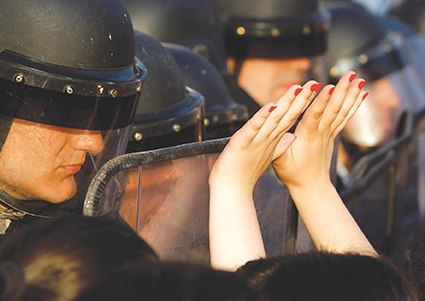Could Russia Be Next for a Velvet Revolution?
Op-ed
A “velvet revolution,” which by definition is a nonviolent transition of power, took place in Georgia 15 years ago. Armenia has lagged a little behind, but finally, it has managed one too. Ukraine also did it . . . almost! Now the question is if a peaceful change of regime is possible in Russia as well.
It is funny that countries like former soviet republics suffer this common malady: the insurmountable desire of democratically elected leaders to be on top forever. They have even found the formula for its implementation in real life – turning themselves from presidents into prime ministers to prolong the fun. The current Russian “emperor” was first to set this uncanny example and other leaders of former soviet republics liked it so much that they decided to experiment with it on their own grounds. The hottest and the most recent cases of the experiment occurred in Georgia and Armenia, where the situation is politically more exciting than in Russia.
Russian people have embraced the governmental ‘castling’ with imperial pleasure and intention, but the mechanical reproduction of this weird political model has not worked quite so well in the Caucasus. Incensed by flagrant unfairness in national political reality, the indignation of Georgians and Armenians went to the extent of toppling the ruling regimes, whose leaders had made up their minds to grasp the helm and stay in the cockpit until the end of the world. The average political scientist would confirm that Russia is favorable soil for a political weirdness of that content and magnitude.
In principle, all those former soviet republics are more or less alike in terms of interpreting and using the features of the erstwhile soviet regime. Maybe the Baltic republics and Georgia are a little different: they have all inherited those features, economic, political, ideological and cultural, from the same predecessor and are not yet out of the woods. They lack political and personal freedom; they are all inclined to authoritarianism; their experience in capitalism, democracy, liberalism, equality, human rights and consent-based governance is terribly scanty; their standard of living is fumbling; their social mentality is still far from what we call “Western;” and their governing style is still autocratic. Yet the scent of democracy is in the air.
Russia is a place where the majority of voters think that Russia is a good empire which should last. And still, the question about the possibility of a velvet revolution in Russia is legitimate because the world has drastically changed, having become more transparent, and as the Russian saying has it, bad habits are contagious. Therefore, Russia might also become the venue of the same change that the world has witnessed in Georgia and Armenia. I just wonder how many people in Russia would go for the velvet revolution on their imperialistic soil to let that change happen. Judging by what I see on Russian television and other news sources, the percentage of people in today’s Russia who would embrace the velvet revolution is almost negligible, but looking into the Russian internet blogging, there are a number of hot hearts and minds that might trigger certain ideological alterations in the average Russian mindset.
When will it happen? Maybe when pigs fly, I don’t know, but I don’t think the Russian people will long resist the global influence of freedom of thought and speech on that truly great nation with huge human and natural resources for improving the life of the unsuspecting rank-and-file in Russia.
Global thinking about Russia prompts the cherished change. What now remains to be guessed is how susceptible the Russian people might be today to what the healthier part of the world is suggesting? Well, my guess is as good as yours. Let’s keep watching.
By Nugzar B. Ruhadze












